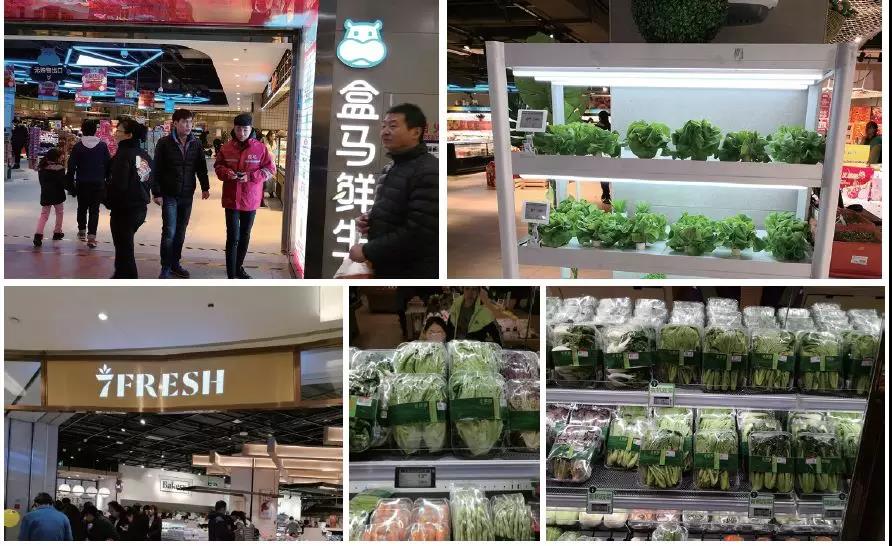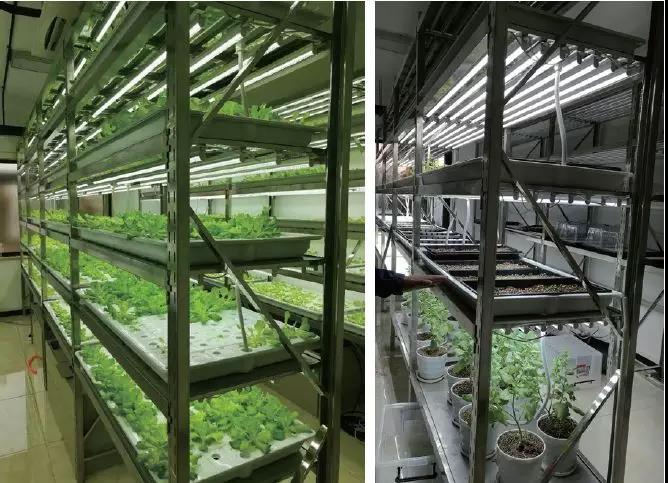3 Looking at the development direction of plant factories from the perspective of e-commerce agricultural investment
Thanks to the strengthening of the concept of “no pollution, health and safety†of agricultural products by Chinese consumers and the improvement of residents' consumption power, similar to the integration of resources in the upstream supply chain by Jingdong and other channels, and the e-commerce platform such as Taobao and Tmall. The development of self-operated business, such as Jingdong, Tmall, Taobao and other e-commerce platforms have become a high-purchase online shopping rate. According to the survey, Jingdong Mall's fresh use rate is as high as 70% or more, and 100-200 yuan is the highest consumption level of fresh online shopping. Among them, customers pay the highest attention to food safety. In recent years, Jingdong and Alibaba have expanded their new retail formats for online and offline resources integration. Alibaba opened its new fresh retail store in 2016 with Boxan Xiansheng Store, while Jingdong opened its doors with 7FRESH and Unbounded Retail in early 2017. Fresh retail (Figure 8).

Figure 8 Box of New Retail Representatives and Freshmen and 7FRESH Stores
Since 2016, Alibaba has opened 30 box horse fresh experience shops in Beijing, Shanghai, Ningbo, Hangzhou, Shenzhen and Chengdu, covering an area of ​​over 4 000 m2 and more than 3,000 types of products. The target users of Box Masheng are high-end Internet users who are 25 to 35 years old and have a certain economic foundation and are concentrated in women. Customers who purchase in the store or place an order on the APP line can achieve “three-kilometer range and half-hour deliveryâ€, which is a major subversion of the fresh sales model of other companies, breaking the limitation of traditional physical store area. Greater sales are created in a limited space. It can be seen from the LED plant growth box of Box Ma Shengsheng in Yizhuangmen store in Beijing that the artificial light plant factory is a clean production method that Alibaba valued to solve the problem of vegetable safety. However, the number of leafy vegetables currently sold by Box Horse Fresh is relatively small, basically it is the hydroponic leafy vegetables or fruit vegetables produced in the greenhouse, and the leafy vegetables produced by the fully artificial light type plant have not been seen.
At the beginning of 2018, Jingdong's 7FRESH was newly established in Beijing Yizhuang Dazu Square and Haidian Huarun Colorful City. Liu Qiangdong announced that he will lay more than 1,000 stores across the country in the next three to five years to explore a new model of unbounded retail. In addition to providing agricultural products sales services, 7FRESH stores also provide food materials and catering services, as well as free express delivery service within half a kilometer. In 2017, JD.com and Mitsubishi Chemical of Japan signed a contract to cooperate in the cultivation of greenhouse leafy vegetables in Beijing. It remains to be seen whether the artificial light plant factory will be used as a high-end leafy vegetable production model in the future.
China's vegetable fresh market share is more than one trillion yuan. Not only Alibaba and Jingdong and other e-commerce companies have started to invest in the fast-moving consumer goods market, but real estate companies have also started agricultural investment. In particular, Country Garden's 2018 agricultural plan has caused the facility agriculture industry. Concerns about the world. China's new retail has inevitably touched on the transformation of agricultural production methods from the perspective of vegetable consumption market and facility industry development, and how the development of artificial high-tech artificial light plant plants is unpredictable.
4 Cross-border fusion plant factory industry development model
There have been many cosmetics industry and biomedical extraction industries in China involved in artificial light plant factories, in the hope of using the efficient production of plant factories to achieve the purpose of targeted material production. Professor Wang Yuejun of Northeastern State University returned to China to start a business project that combines artificial light plant plants and bioreactor technology, using lettuce and tobacco to produce various protein drugs and artemisinin, including special drugs for treating tumors. The antibodies PD-1, PDL-1, blood products such as albumin and eight factors were cloned (Fig. 9). This combination of technologies will bring technological changes to the biopharmaceutical manufacturing industry, using efficient plant production using artificial light plant technology to increase the efficiency of various bioreactors, enabling the efficient production of targeted proteins, vaccines and antibodies. Substance, greatly reducing the price of some major disease treatment drugs. It is said that this technology has always been an international monopoly. Japan has already achieved industrial production in the field of using strawberry to produce veterinary antibodies, and China has not seen breakthroughs in this field.

Figure 9 Production of useful substances in artificial light plant plants
5 Bottlenecks and technological trends in the industrialization of artificial light plant factories
The artificial light plant factory is the first to face the Chinese vegetable supply market. In view of the current situation of large-scale vegetable planting, variety and low price, the industrialization of artificial light-type plant factories is bound to be unsatisfactory. Judging from the above-mentioned typical investment and construction behaviors of industrial enterprises, the bottleneck of industrialization development of artificial light-type plant factories in China is mainly limited by the failure to achieve a stable and stable production and sales seamless link, mainly reflected in:
1 Lack of market demand for high efficiency and low price LED light source for artificial light plant factories; 2 Failure to form more mature plant plant planning and material supply services; 3 Environmental control technology software and hardware are difficult to correspond to plant plant efficiency Production, its effectiveness needs to be improved; 4 production process standards and large-scale production technology (production automation) for specific plants (variety) are still immature; 5 failed to cultivate a stable and continuous customer group (production and sales docking Not smooth). The existing artificial light-type plant factories covering an area of ​​more than 1 000 m2 in China are at a loss. It is possible to increase the vegetable production of the plant by 30% and the production cost by 30% by various technical means. Going to profit.
The current technologies such as artificial intelligence and big data also provide a powerful tool and platform for the production improvement and sales docking of artificial light plant factories. The combination of pragmatic and effective production, education and research will definitely be the industry of artificial light plant factories in China. Development provides technical support. Therefore, the direction of industrialization of artificial light plant factories in China can be summarized as follows:
1 The industrialization of artificial light plant factories will start from the first-tier cities with high economic development and high-end leafy food consumption needs, such as Shenzhen, Shanghai and Beijing, to play their own production, clean production and fresh consumption. The technological advantage of consumption provides a high-quality, fresh leafy supply service for a specific high-income group that fully addresses the safety of agricultural products.
2 The industrialization of artificial light plant plants will start from the standardized production of singular leafy vegetables with a certain scale. For example, the production scale of lettuce is more than 3,000 per day, but it is not a diversified vegetable production mode. Large-scale production in the production workshop or single vegetable will become the mainstream production method in the future, otherwise it is difficult to call it a plant factory.
3 Whether it is B2C, B2B, or O2O, plant factory production will use a certain e-commerce platform or a number of cooperation to form a new business model, and enterprises investing in plant factories will implement the entire industrial chain of vegetable production, distribution, and sales. The era of integrated services and the pursuit of a diverse supply of vegetables is basically ending. Only companies that can achieve high yield and high efficiency, focusing on large-scale and standardized vegetable production can survive in this complex and fiercely competitive vegetable market in China.
4 The future industrial competitive advantage of artificial light plant plants lies in the limited channel supply of specific vegetable products. The production technology and talent advantages will be combined with the advantages of the varieties. In the future, not only the technical consulting services and problem solving in the traditional sense will be emphasized, but also the more attention will be paid. Derived technological innovation services for specific varieties and new production processes.
5 Whether artificial light plant factories can achieve sustainable development lies not in technology but in talent selection and competition. This is because talents who are currently able to master technology and have certain technological innovation are especially lacking in young people. Corresponding to future social market demand and consumption upgrade, talent competition will be a key factor in determining whether a company can sustainably develop.
6 Conclusion
Vegetable production in artificial light plant plants will be an innovative improvement in the way vegetables are produced, as well as in the way consumers consume vegetables. With the development of the vegetable consumer market for more quality, safety, higher quality, fresher and healthier, and more fast-growing individualized vegetable needs, artificial light plant technology can target the production and quality control of targeted varieties for specific populations. It will surely become a new production method for the future society to provide personalized vegetables for high-quality production and high-income people. In order to cope with the market demand and consumption upgrade of the future society, the cultivation of talents in the plant factory field will become an urgent and important task to promote industrial development.

Polyethylene tape refers to the adhesive tape products with polyethylene as the base material and adhesive compound on the other side. Alias polyethylene adhesive tape, compound polyethylene tape, coated polyethylene tape;
And because the product is mainly used for pipeline anti-corrosion, so also known as polyethylene anti-corrosion adhesive tape, polyethylene anti-corrosion adhesive tape, anti-corrosion adhesive tape;
At the same time, because it can be cold winding construction in anticorrosion operation, it is commonly known as polyethylene cold winding tape, polyethylene cold winding tape, pipeline anticorrosion cold winding tape, pipeline cold winding tape, cold winding tape and cold winding tape.
Heat shrinkable film is Polythene Tape, it has hot shrinkage function after irradiation tensile , can be enshrouded content fused into an organic whole when used during heating, insulation, sealing, waterproof, and so on.
It's a transparent electrical Insulation Tape,together with other Electrical Tapes,Insulating Tape and Special Adhesive,become our best-selling products.
Polythene Tape,Vinyl Electrical Tape,Pipe Wrap Insulation Tape,Electrical Insulation Tape
CAS Applied Chemistry Materials Co.,Ltd. , https://www.casac1997.com
